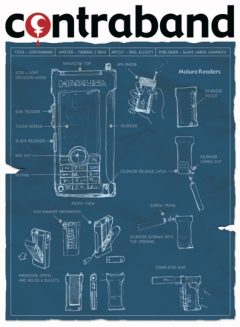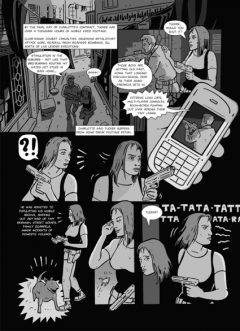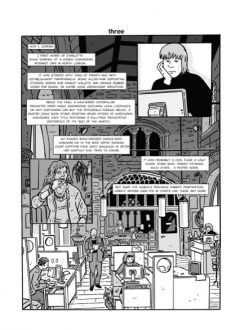Review: Contraband (Markosia Enterprises)
Set in a world of sensational videos being filmed on mobiles and uploaded to the sharing platform Contraband, community journalist Toby gets himself in deeper than he expects when he accidentally films the activities of the notorious Tucker. Blackmailed into finding the enigmatic Charlotte, Toby is drawn into a world of underground video sharing, political protests and the seedy underbelly of the web.
 Publisher: Markosia
Publisher: Markosia
Writer: Thomas J Behe
Artist: Phil Elliott (illustrator), Ian Sharman (inks), Cherie Donovan (toner), Marcus Hohl (cover)
Price: Order via the Contraband website
Contraband is a really ambitious and complex tale about the perils and pitfalls of the modern video sharing culture. It satirises the fleeting nature of fame in the social media world as well as looking at the way the edges blend and the extremes become normality all too quickly. Writer Thomas J Behe brings in a wide number of themes for this book which is densely written and feels more like a novel than a comic at times. His use of long diatribes for the characters, especially from main bad guy Tucker make for some dense pages, which aren’t always the easiest to read. Especially when used in conjunction with a multiple time period story which leaps around from setting to setting.
 It’s an interesting take on a comic, and although it is a challenge to read at times you have to admire the complexity and depth which Behe is aiming for with this. His lofty ambitions are brilliantly matched by artist Phil Elliot, who’s meticulous style we last saw in the the 77 (with our very own Mike Powell on writing duties). His deceptively simple but very structured and formal style suits this complex story perfectly, allowing Behe to fill the pages with dialogue heavy scenes, without ever feeling like the art is being short changed. Elliot has a really strong eye for the essence of a scene and is able to capture moments with a relatively simple style that manages to give the book both a very contemporary small press feel and also very classic comic book style. It reminded us a lot of Ben Dickson’s work in a A New Jerusalem, which did this balancing act brilliantly.
It’s an interesting take on a comic, and although it is a challenge to read at times you have to admire the complexity and depth which Behe is aiming for with this. His lofty ambitions are brilliantly matched by artist Phil Elliot, who’s meticulous style we last saw in the the 77 (with our very own Mike Powell on writing duties). His deceptively simple but very structured and formal style suits this complex story perfectly, allowing Behe to fill the pages with dialogue heavy scenes, without ever feeling like the art is being short changed. Elliot has a really strong eye for the essence of a scene and is able to capture moments with a relatively simple style that manages to give the book both a very contemporary small press feel and also very classic comic book style. It reminded us a lot of Ben Dickson’s work in a A New Jerusalem, which did this balancing act brilliantly.
Writing a tech-focused book like this is never easy, especially one this dense, as the very act of writing the story about something so current means it can become out of date almost as quickly as it arrives. The story is nominally set in the early 00s and so captures that wild west spirit (although this isn’t obvious) and while the themes of privacy and content online is still very pertinent, some of the language and approaches to tech feel a bit old fashioned already. While this gives it a slightly retro feel, it’s perhaps not quite as obviously a period piece as it needs to be and these feel a bit lost.
 Overall Contraband is one of those books which, although we have a lot of criticisms about, we can’t be too harsh on as it drew us into the story and the world. We have found ourselves dipping in and out of it over a long period of time attempting to get a hang on just what it was all about and it reminded us of John Harris Dunning’s Tumult which had a similar effect on us. While the obvious suggestions would be to simplify it and make a more pacey, action thriller, as is so often the case with small press comics that very act endangers the spirit and soul of the piece.
Overall Contraband is one of those books which, although we have a lot of criticisms about, we can’t be too harsh on as it drew us into the story and the world. We have found ourselves dipping in and out of it over a long period of time attempting to get a hang on just what it was all about and it reminded us of John Harris Dunning’s Tumult which had a similar effect on us. While the obvious suggestions would be to simplify it and make a more pacey, action thriller, as is so often the case with small press comics that very act endangers the spirit and soul of the piece.
So in the end we have to accept that while Contraband isn’t the easiest read, there is an intention there which is praise worthy and the final product looks and feels top drawer thanks to the artwork and characterisation (plus the cover design is especially slick!). As such is the kind of book which will hopefully gain an audience by those who are bold enough to take the risk to explore this illicit world.



August 15, 2025 @ 3:55 pm
Thanks for sharing. I read many of your blog posts, cool, your blog is very good. https://www.binance.info/sl/register?ref=IJFGOAID
September 17, 2025 @ 1:43 am
Can you be more specific about the content of your article? After reading it, I still have some doubts. Hope you can help me.
December 7, 2025 @ 6:25 am
Thanks for sharing. I read many of your blog posts, cool, your blog is very good. https://www.binance.info/register?ref=IXBIAFVY
February 2, 2026 @ 2:22 pm
Thanks for sharing. I read many of your blog posts, cool, your blog is very good.
February 3, 2026 @ 11:08 am
https://askoff.ru
February 3, 2026 @ 3:25 pm
asklong.ru
February 4, 2026 @ 6:33 am
new york fashion model https://otvetnow.ru free online degree program